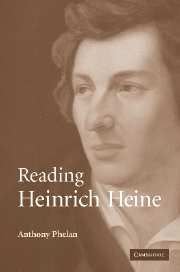Book contents
- Frontmatter
- Contents
- Acknowledgements
- Introduction
- PART I THE BIOGRAPHICAL IMPERATIVE
- 1 The biographical imperative: Karl Kraus
- 2 The biographical imperative: Theodor Adorno
- 3 The biographical imperative: Helmut Heißenbüttel – pro domo
- 4 From the private life of Everyman: self-presentation and authenticity in Buch der Lieder
- 5 In the diplomatic sense: reading Reisebilder
- PART II THE REAL HEINE
- PART III PARISIAN WRITING
- PART IV EPILOGUE
- Notes
- Bibliography
- Index
2 - The biographical imperative: Theodor Adorno
Published online by Cambridge University Press: 22 September 2009
- Frontmatter
- Contents
- Acknowledgements
- Introduction
- PART I THE BIOGRAPHICAL IMPERATIVE
- 1 The biographical imperative: Karl Kraus
- 2 The biographical imperative: Theodor Adorno
- 3 The biographical imperative: Helmut Heißenbüttel – pro domo
- 4 From the private life of Everyman: self-presentation and authenticity in Buch der Lieder
- 5 In the diplomatic sense: reading Reisebilder
- PART II THE REAL HEINE
- PART III PARISIAN WRITING
- PART IV EPILOGUE
- Notes
- Bibliography
- Index
Summary
When Kraus speaks of a ‘form of life’, he is using a moral category. It seems likely that Kraus himself remained blind to the full impact of the economic metaphor underlying his polemic and only marginally aware, through his own journalistic and publishing practices, of those fundamental changes in cultural production which gave the true direction of his attack on the contemporary press. His major successor in the analysis of Heine as a cultural problem, the philosopher and critic Theodor Adorno, was acutely aware of the questions raised by ‘political economy’ for Heine's work and its reception.
HEINE, THE MARKET, AND THE COLD WAR
Adorno's essay ‘Die Wunde Heine’ sets out to be a commemorative talk for the one-hundredth anniversary of the poet's death in 1956. Adorno claims that, as a result of some dialectical reversal, what had been failure is transformed into success when after a hundred years an ‘intentionally false folksong becomes a great poem’. This suggests that Adorno is aware of the paradoxical nature of such anniversaries. For post-war readers, he argues, Heine seems to mean something other than what he had ‘intended’ or what he had meant to his contemporaries, seen as historical readers; but this problem for commemoration is also historically determined: ‘Heine’ is seen as an effect – as well as a symptom – of the way in which the Third Reich had been repressed in the old Federal Republic, as much as of the actual suppression of Heine's works by the Third Reich.
- Type
- Chapter
- Information
- Reading Heinrich Heine , pp. 20 - 32Publisher: Cambridge University PressPrint publication year: 2007

